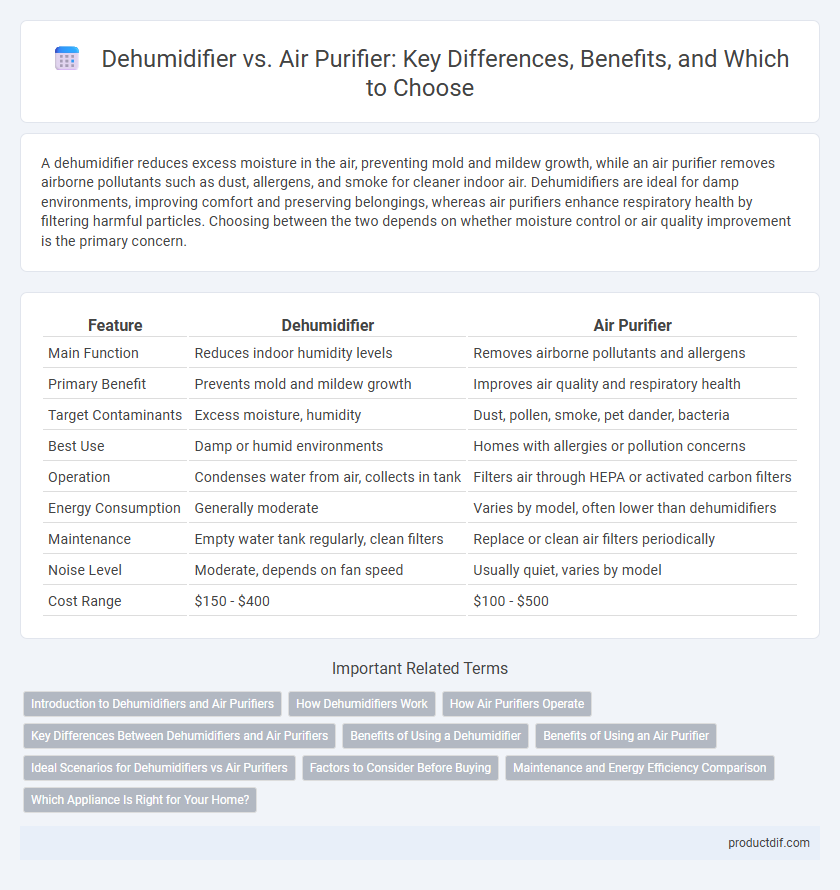A dehumidifier reduces excess moisture in the air, preventing mold and mildew growth, while an air purifier removes airborne pollutants such as dust, allergens, and smoke for cleaner indoor air. Dehumidifiers are ideal for damp environments, improving comfort and preserving belongings, whereas air purifiers enhance respiratory health by filtering harmful particles. Choosing between the two depends on whether moisture control or air quality improvement is the primary concern.
Table of Comparison
| Feature | Dehumidifier | Air Purifier |
|---|---|---|
| Main Function | Reduces indoor humidity levels | Removes airborne pollutants and allergens |
| Primary Benefit | Prevents mold and mildew growth | Improves air quality and respiratory health |
| Target Contaminants | Excess moisture, humidity | Dust, pollen, smoke, pet dander, bacteria |
| Best Use | Damp or humid environments | Homes with allergies or pollution concerns |
| Operation | Condenses water from air, collects in tank | Filters air through HEPA or activated carbon filters |
| Energy Consumption | Generally moderate | Varies by model, often lower than dehumidifiers |
| Maintenance | Empty water tank regularly, clean filters | Replace or clean air filters periodically |
| Noise Level | Moderate, depends on fan speed | Usually quiet, varies by model |
| Cost Range | $150 - $400 | $100 - $500 |
Introduction to Dehumidifiers and Air Purifiers
Dehumidifiers reduce indoor humidity by extracting excess moisture, preventing mold growth and improving air quality in damp environments. Air purifiers remove airborne pollutants such as dust, pollen, and allergens through filters like HEPA, enhancing respiratory health. Both appliances target different air quality issues, making them essential for maintaining a comfortable and healthy living space.
How Dehumidifiers Work
Dehumidifiers work by drawing moist air over refrigerated coils, causing condensation that collects water and reduces humidity levels in the environment. This process helps prevent mold growth and improves indoor air quality by maintaining optimal moisture balance. Unlike air purifiers, which filter airborne particles and allergens, dehumidifiers specifically target excess moisture to create a more comfortable living space.
How Air Purifiers Operate
Air purifiers operate by drawing air through filters that capture airborne particles such as dust, pollen, smoke, and bacteria, improving indoor air quality. Many models employ HEPA filters to trap particles as small as 0.3 microns, while others use activated carbon filters to eliminate odors and volatile organic compounds (VOCs). Some air purifiers also incorporate UV-C light technology to neutralize germs and allergens, providing comprehensive air cleansing beyond the mechanical filtration process.
Key Differences Between Dehumidifiers and Air Purifiers
Dehumidifiers primarily reduce indoor humidity levels by extracting excess moisture from the air, preventing mold growth and improving comfort in damp environments. Air purifiers focus on improving air quality by filtering out airborne pollutants, allergens, and particulates, using HEPA filters or activated carbon technologies. While both appliances enhance indoor air, dehumidifiers target moisture control, whereas air purifiers target contaminant removal.
Benefits of Using a Dehumidifier
A dehumidifier effectively reduces indoor humidity levels, preventing mold growth and protecting furniture from moisture damage. It improves air quality by reducing allergens such as dust mites and mildew, making it ideal for allergy sufferers. By maintaining optimal humidity, a dehumidifier also enhances comfort and can reduce the workload on air conditioning systems.
Benefits of Using an Air Purifier
Air purifiers improve indoor air quality by removing allergens, dust, smoke, and harmful pollutants, which helps reduce respiratory issues and allergy symptoms. They also eliminate airborne bacteria and viruses, contributing to a healthier living environment. Unlike dehumidifiers that control humidity levels, air purifiers specifically target airborne contaminants, making them essential for people with asthma or allergy sensitivities.
Ideal Scenarios for Dehumidifiers vs Air Purifiers
Dehumidifiers are ideal in environments with excessive moisture, such as basements or areas prone to mold and mildew, effectively reducing humidity levels to prevent structural damage and allergen growth. Air purifiers excel in filtering airborne particles like dust, pollen, smoke, and pet dander, making them essential for improving indoor air quality in homes with allergy sufferers or respiratory conditions. Selecting between a dehumidifier and an air purifier depends on whether the primary concern is moisture control or airborne pollutant removal.
Factors to Consider Before Buying
When choosing between a dehumidifier and an air purifier, factors such as room size, specific air quality concerns, and humidity levels must be considered. Dehumidifiers are ideal for reducing excess moisture and preventing mold growth, while air purifiers target airborne particles like allergens, dust, and pollutants. Energy consumption, maintenance costs, and noise levels also play crucial roles in determining the best appliance for your indoor environment.
Maintenance and Energy Efficiency Comparison
Dehumidifiers require regular filter cleaning and water tank emptying to prevent mold growth, whereas air purifiers need frequent filter replacements to maintain optimal performance. Energy consumption varies, with dehumidifiers typically using more power due to compressor operation, while air purifiers with HEPA filters are generally more energy-efficient. Choosing the right appliance depends on balancing ongoing maintenance efforts against energy costs based on specific household needs.
Which Appliance Is Right for Your Home?
Choosing between a dehumidifier and an air purifier depends on your home's specific needs: a dehumidifier effectively reduces excess moisture to prevent mold and mildew, ideal for damp environments, while an air purifier removes airborne particles like dust, pollen, and allergens to improve indoor air quality. For households dealing with high humidity levels or moisture-related problems, a dehumidifier is the better choice, whereas those with allergies or asthma benefit more from an air purifier's filtration capabilities. Understanding the primary issue in your home--humidity versus air contaminants--guides the optimal appliance selection for healthier living spaces.
Dehumidifier vs Air Purifier Infographic

 productdif.com
productdif.com